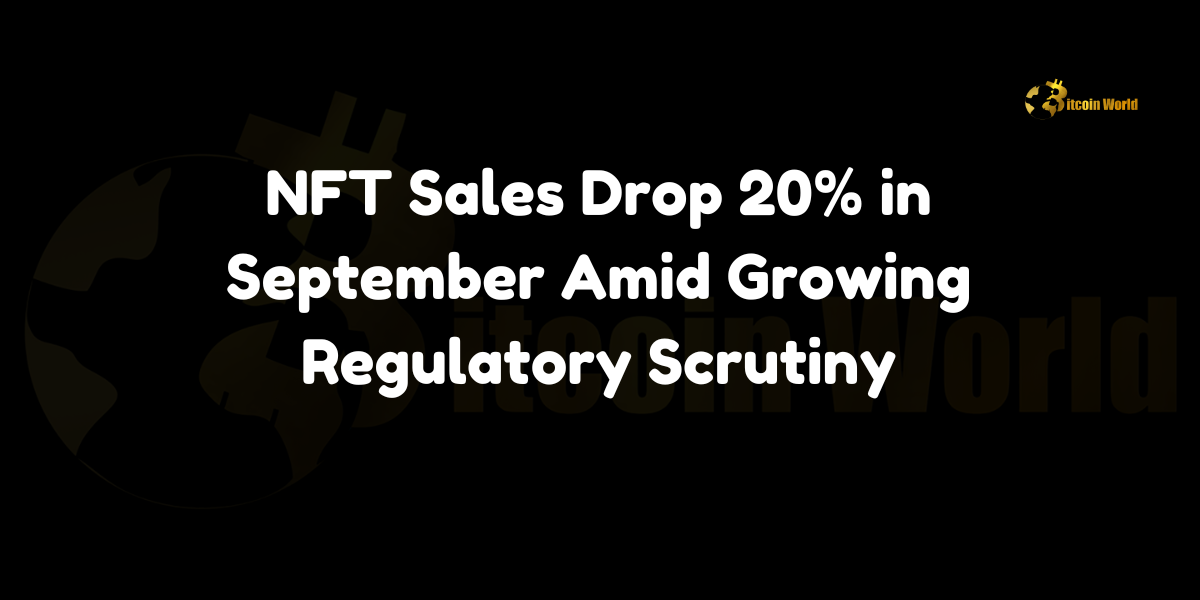NFT Sales Plummet 20% in September Amid Regulatory Scrutiny
September proved to be another tough month for the NFT market, with sales dropping by 20% compared to the previous month, according to CryptoSlam data cited by Cointelegraph. Total monthly sales dipped to $296 million, down from $373 million in August. This decline extends the downturn seen since March, when NFT sales reached a peak of $1.6 billion. The sharp drop in transaction volumes and increased regulatory pressure from U.S. authorities have further dampened the market’s performance.
The NFT space, once hailed as the frontier of digital collectibles and ownership in the art, gaming, and entertainment sectors, continues to face mounting challenges. As sales and transaction volumes slump, regulators are zeroing in on platforms and marketplaces, putting the industry in an uncertain position.
Key NFT Market Data for September
The latest CryptoSlam data paints a sobering picture for the NFT market. While total sales dropped significantly, transaction volumes saw an even steeper decline:
- Sales: $296 million, down from $373 million in August (a 20% drop)
- Transaction volumes: 4.9 million, down from 7.3 million in August (a 32% drop)
- Average transaction value: $60, up 18% from the previous month
Although the average value of NFT transactions rose by 18% to $60, the overall decline in activity indicates that investors are becoming more cautious, particularly amid the increasing regulatory scrutiny from U.S. authorities.
Regulatory Pressure: A Key Factor
The decline in NFT sales and transaction volumes coincides with increased regulatory action targeting the NFT market. U.S. regulators, including the Securities and Exchange Commission (SEC), have ramped up their scrutiny of NFT platforms, with OpenSea and other major entities facing investigations and enforcement actions.
The SEC has raised concerns about NFTs potentially being classified as securities, which would subject them to much stricter regulations. This has caused apprehension across the industry, as platforms may need to adjust their operations to comply with existing securities laws.
For instance, OpenSea, one of the leading NFT marketplaces, has come under fire for alleged insider trading and other regulatory issues. This increased regulatory focus has drawn mixed reactions from the industry, with some welcoming the added oversight as a step toward legitimacy, while others fear it may stifle innovation in the NFT space.
Impact on NFT Platforms and Projects
The drop in sales and transaction volumes reflects a broader market uncertainty, with both retail and institutional investors adopting a more cautious approach. Many platforms are navigating this difficult environment by adjusting their strategies and tightening compliance measures to avoid regulatory backlash.
For some NFT creators and platforms, the increased scrutiny represents a double-edged sword. On one hand, clearer regulatory frameworks could help eliminate bad actors and foster a more trustworthy market. On the other hand, many fear that stringent regulations could make it harder for smaller independent creators and startups to thrive.
For example, platforms such as Rarible and SuperRare have taken proactive steps to ensure compliance by enhancing security features and implementing stricter KYC (Know Your Customer) processes. However, these measures come at the cost of slower user onboarding and higher operational costs, which may further hinder market growth.
Market Sentiment and Future Outlook
The decline in NFT sales and transaction volumes raises questions about the future of the market, particularly as regulatory scrutiny intensifies. While the NFT space saw tremendous growth in 2021 and the early months of 2022, the current downturn indicates that the market is entering a period of consolidation.
Despite the recent dip, some experts remain optimistic about the long-term potential of NFTs, particularly as the technology continues to evolve. Yuya Hasegawa, a market analyst at Bitbank Exchange, noted that while regulatory intervention could temporarily suppress growth, it may also provide the legitimacy and structure needed for NFTs to become a more widely accepted asset class in the future.
In addition, the rise in the average transaction value suggests that while overall activity may be slowing, higher-value transactions are still occurring, signaling ongoing interest in premium NFTs and blue-chip collections like CryptoPunks and Bored Ape Yacht Club.
Opportunities in the NFT Space
For those looking to navigate the current downturn, there are still opportunities in the NFT market. The focus may shift toward high-value collectibles, gaming NFTs, and real-world asset tokenization, areas where investor interest remains relatively strong despite the broader market slowdown.
Additionally, as regulators continue to clarify rules around NFTs, platforms and projects that adopt proactive compliance measures may gain a competitive advantage by positioning themselves as safe, regulated spaces for users and investors.
Conclusion: A Critical Moment for NFTs
The 20% drop in NFT sales in September marks another challenging month for the NFT market, with both transaction volumes and sales continuing to decline. However, the rising average transaction value suggests that high-end collectibles and premium assets are still in demand, even amid broader market weakness.
Regulatory scrutiny, particularly from U.S. authorities, has contributed to the decline in market activity, but it could also pave the way for a more structured and legitimate NFT market in the long run. Platforms that can adapt to the new regulatory landscape may find themselves in a stronger position as the market matures.
The NFT market’s future depends largely on how platforms and investors react to regulatory challenges and whether the space can evolve to meet both compliance and innovation demands. While the short-term outlook remains uncertain, the long-term potential of NFT technology continues to draw interest from investors, developers, and creators alike.
Internal Link Reference
To explore the impact of regulatory scrutiny on cryptocurrency markets, check out our detailed article on crypto regulation trends, where we discuss how increased oversight is reshaping the industry.
Disclaimer: The information provided is not trading advice, Bitcoinworld.co.in holds no liability for any investments made based on the information provided on this page. We strongly recommend independent research and/or consultation with a qualified professional before making any investment decisions.




